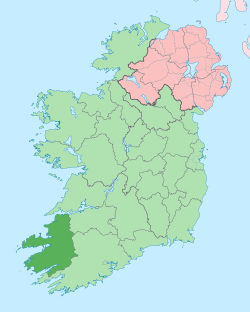Kenmare
Kenmare (Irish: An Neidín, meaning "the little nest")[7][8] is a small town in the south of County Kerry, Ireland. The name Kenmare is the anglicised form of Ceann Mara,[7] meaning "head of the sea", referring to the head of Kenmare Bay.
Kenmare An Neidín | |
|---|---|
Town | |
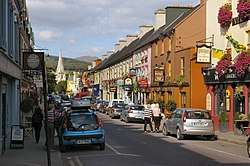 Henry Street, Kenmare | |
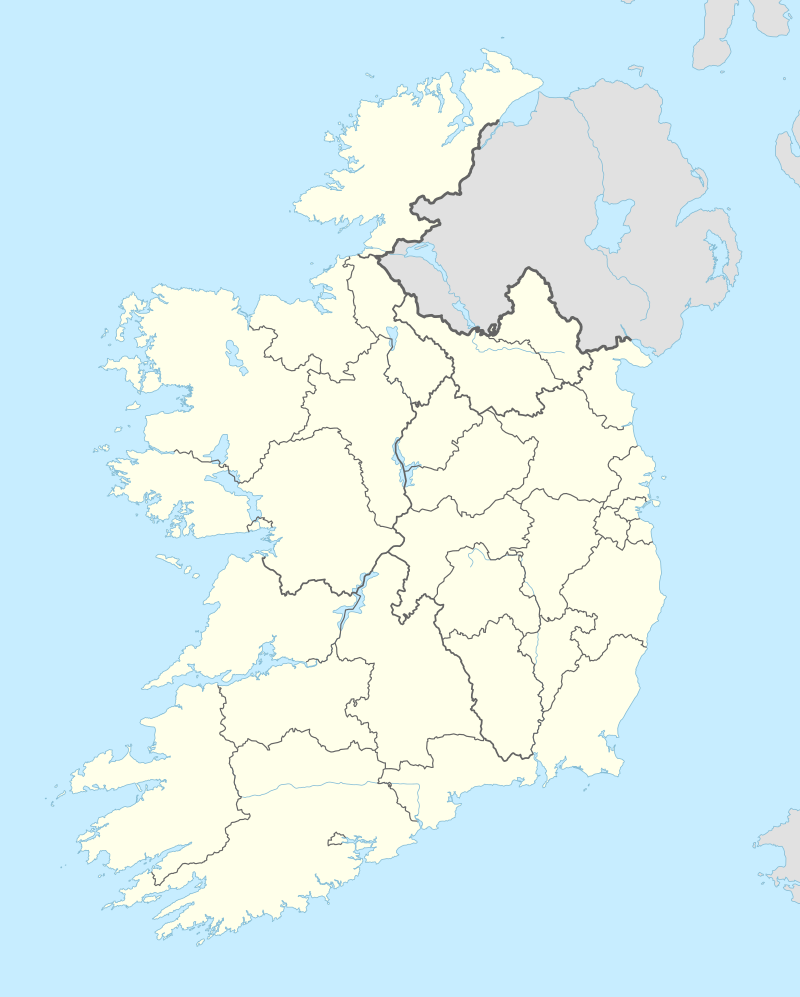 Kenmare Location in Ireland | |
| Coordinates: 51.8801°N 9.5835°W | |
| Country | Ireland |
| Province | Munster |
| County | County Kerry |
| Population (2016)[1] | 2,376 |
| Irish Grid Reference | V908709 |
| Website | www |
| Year | Pop. | ±% |
|---|---|---|
| 1821 | 605 | — |
| 1831 | 1,072 | +77.2% |
| 1841 | 1,339 | +24.9% |
| 1851 | 1,509 | +12.7% |
| 1861 | 1,200 | −20.5% |
| 1871 | 1,205 | +0.4% |
| 1881 | 1,279 | +6.1% |
| 1891 | 1,189 | −7.0% |
| 1901 | 1,122 | −5.6% |
| 1911 | 1,034 | −7.8% |
| 1926 | 883 | −14.6% |
| 1936 | 921 | +4.3% |
| 1946 | 906 | −1.6% |
| 1951 | 907 | +0.1% |
| 1956 | 1,054 | +16.2% |
| 1961 | 1,046 | −0.8% |
| 1966 | 1,113 | +6.4% |
| 1971 | 903 | −18.9% |
| 1981 | 1,123 | +24.4% |
| 1986 | 1,130 | +0.6% |
| 1991 | 1,366 | +20.9% |
| 1996 | 1,420 | +4.0% |
| 2002 | 1,844 | +29.9% |
| 2006 | 1,701 | −7.8% |
| 2011 | 2,175 | +27.9% |
| 2016 | 2,376 | +9.2% |
| [1][2][3][4][5][6] | ||
Location
Kenmare is located at the head of Kenmare Bay (where it reaches the farthest inland), sometimes called the Kenmare River, where the Roughty River (An Ruachtach) flows into the sea, and at the junction of the Iveragh Peninsula and the Beara Peninsula. The traditional Irish name of the bay was Inbhear Scéine from the Celtic inver, which is recorded in the 11th Century narrative Lebor Gabála Érenn as the arrival point of the mythological Irish ancestor Partholón. It is also located near the MacGillycuddy's Reeks, Mangerton Mountain and Caha Mountains and is a popular hillwalking destination. Nearby towns and villages are Tuosist, Ardgroom, Glengarriff, Kilgarvan, Killarney, Templenoe and Sneem.
Kenmare is in the Kerry constituency of Dáil Éireann.
History
The entire area was granted to the English scientist Sir William Petty by Oliver Cromwell as part payment for completing the mapping of Ireland, the Down Survey in 1656. He laid out the modern town circa 1670. Before him, a previous surveyor of Ireland, Sir Valentine Browne (1510-1589), ancestor of the Earl of Kenmare, was granted some lands in County Kerry during the resulting plantation, the Munster Plantation.
The three main streets that form a triangle in the centre of the town are called Main Street (originally William Street, after Sir William, 1st. Marquis of Lansdowne), Henry Street (originally Sound Road), after the son of William the 1st. Marquis and Shelbourne Street (Henry Petty became the first Earl of Shelburne). This name was also later applied to Shelbourne Road in Dublin.
However, the area has more ancient roots. One of the largest stone circles in the south-west of Ireland[9] is close to the town, and shows occupation in the area going back to the Bronze Age (2,200–500 B.C), when it was constructed. The circle has 15 stones around the circumference with a boulder dolmen in the centre.[9]
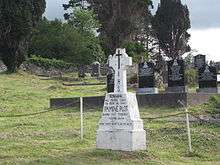
Vikings are said to have raided the area around the town which at that time was called Ceann Mhara, which means "head of the sea" in Irish.
The convent in the town, the Poor Clare Sisters, was founded in 1861 when five nuns including Sister Mary Frances Cusack (The Nun of Kenmare), who was also an author and publisher of many books, moved to Kenmare from their convent in Newry, County Down. Under the guidance of Mother Abbess O'Hagan in 1864 a lace-working industry was established and Kenmare lace became noted worldwide.The convent no longer exists and Pobalscoil Inbhear Scéine secondary school occupies this site since 2001.
A suspension bridge, which is claimed to be the first in Ireland, over the Kenmare River was opened in 1841 and served the community till 1932 when it was replaced by a new concrete bridge.[10]
During and after the Civil War (1922-1923), there were a number of incidents in Kenmare, including the killing of O'Connor brothers in September 1922 by Anti-Treaty forces,[11] and an attack on the daughters of a local doctor in 1923 (the latter sometimes referred to as the 'Kenmare incident').[12] Kenmare was briefly held by Anti-Treaty forces during the Civil War, before being retaken by National Army troops in December 1922.[11]
The town library is one of the Carnegie Libraries funded by Andrew Carnegie. It opened in 1918, and the architect was R.M. Butler.[13][14] The library building is now home to the Carnegie Arts Centre and theatre, hosting a local drama group and a number of travelling productions each year, as well as music and comedy nights.[15]
Holy Cross Catholic Church in Kenmare was consecrated in 1864. It was built under the guidance of Archdeacon Fr. John O'Sullivan - who is interred within the church.[16] The church has stained glass windows by O'Connor London (1863), by Caseys Dublin (1864) and by Earley Dublin (1864). The organ is by Telford & Telford(1865). Buried in the church grounds is Monsignor P F Cremin (died 2001), who was a periitus or theological expert at Vatican II. He was a native of Kenmare and had been Professor of Canon Law and Moral Theology at St Patrick's College, Maynooth from 1949 until 1980. He was a brother of Con Cremin, an Irish diplomat, who represented Ireland in France and Germany during World War II and subsequently in Portugal, the Holy See, the United Kingdom and at the United Nations.
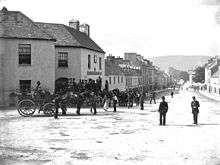
The Church of Ireland church of St Patrick celebrated its 150th anniversary in 2008.[17] The town has been a winner in the Irish Tidy Towns Competition in 2013, 2000 and was a runner-up in 2003 and 2008.
Tourism
Kenmare lies on two noted Irish tourist routes, the Ring of Kerry and the Ring of Beara, approximately 32 kilometres (20 mi) from Killarney. As a result, it is a popular tourist destination and many of the businesses in the area cater to tourists. The town is noted for its food and pubs.
Since the late 1990s the tourism industry has driven local construction work, with land being sold at high prices to developers wishing to build estates of holiday homes.[18] This has led to an increase in the town's population, particularly during the peak tourist season, and prompted fears among some residents that the town is becoming overdeveloped and losing much of its identity.[19]
Notable people
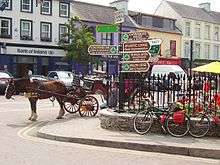
Inter-county Gaelic footballers Mickey 'Ned' O'Sullivan, Stephen O'Brien and Paul O'Connor are from the Kenmare area, while Pat Spillane is from nearby Templenoe. Kenmare is also the home of Irish Olympic slalom skier Thos Foley.
Kenmare was home to composer Ernest John Moeran for a number of years up to his death and a local bar was named after him - but has since been renamed. Diplomat Con Cremin was also from Kenmare, as is senator Mark Daly. Writer Anna McPartlin grew up in Kenmare, and her 2007 novel Apart from the Crowd was set in the town.
Francis Brennan is the owner of the five-star Park Hotel in Kenmare.[20] He and his brother John, owner of the nearby Dromquinna Manor Hotel in Templenoe, are known for their TV series "At Your Service".[21]
Fair days
Due to its location at the centre of a large agricultural area, Kenmare served as the local market town. Until the establishment of an auction mart in the early 1990s, the approximately monthly fair days were a time when farmers would stand their animals in the streets for sale to visiting stock dealers. The only fair which continues to be held is that of 15 August, which coincides with the Catholic Holy Day of Obligation marking the Assumption of Mary. The day attracts crowds of locals and visitors and is the busiest day of the year in Kenmare.[22]
Transport
Bus
There are daily bus-services in summer to Killarney and in the off-season, the bus runs Monday-Friday. There is also a daily service to/from Cork in the summer months on the N71 via Bantry and Clonakilty.
Road
The N71 also connects Kenmare to Killarney on a mountainous and scenic part of the Ring of Kerry route via Moll's Gap and Ladies View. Alternatively one can reach Killarney via the slightly longer but more comfortable route through Kilgarvan. Kenmare also lies on the N71 national secondary road south-Cork route to Glengarriff. In November 2014, the Eastern Relief Road was opened, allowing drivers from the R569 Kilgarvan Road to bypass the town centre when accessing the supermarkets and schools.
Rail
Kenmare railway station opened on 4 September 1893 and finally closed on 1 February 1960.[23]
Air
The nearest airport is Kerry Airport, which is 50 km away. A wider range of services is available from Cork Airport, which is 90 km away. There is a daily direct bus service to/from Cork Airport in the summer months.
Services
The town has a primary and secondary school, a public library, community hospital, as well as Catholic, Church of Ireland and Methodist churches.
Sports
The GAA club, Kenmare Shamrocks, competes in Kerry GAA competitions. George Mayberry from Kenmare participated in the 1908 Summer Olympics.
Kenmare Kestrels Basketball Club was founded in 2006 and competes in the Kerry Area Basketball League.
The local soccer team Inter Kenmare F.C. competes in the Kerry District League at U17, Youth & Senior Men's/Women's level and in the Kerry Schoolboys/girls League for all underage teams.
In popular culture
In the fictional Harry Potter universe, Kenmare is home to the Kenmare Kestrels, one of only thirteen Quidditch teams that play in the Quidditch League of Britain and Ireland. The team players wear emerald-green robes emblazoned with two yellow K's across the chest.[24]
The eponymously titled song "As I leave behind Neidín" was written by Jimmy McCarthy and recorded by Mary Black amongst others.
The town was also referenced in the Star Trek: Enterprise episode "Breaking the Ice". The crew aboard the spaceship answer questions received from school children who are said to be from Kenmare.
See also
- List of towns and villages in Ireland
- Market Houses in Ireland
References
- "Census 2016 - Small Area Population Statistics (SAPMAP Area) - Settlements - Kenmare". Census 2016. Central Statistics Office.
- "Census for post 1821 figures". Cso.ie. Archived from the original on 9 March 2005. Retrieved 24 August 2013.
- histpop.org Archived 7 May 2016 at the Wayback Machine
- "NISRA – Northern Ireland Statistics and Research Agency (c) 2013". Nisranew.nisra.gov.uk. 27 September 2010. Archived from the original on 17 February 2012. Retrieved 24 August 2013.
- Lee, JJ (1981). "On the accuracy of the Pre-famine Irish censuses". In Goldstrom, J. M.; Clarkson, L. A. (eds.). Irish Population, Economy, and Society: Essays in Honour of the Late K. H. Connell. Oxford, England: Clarendon Press.
- Mokyr, Joel; O Grada, Cormac (November 1984). "New Developments in Irish Population History, 1700–1850". The Economic History Review. 37 (4): 473–488. doi:10.1111/j.1468-0289.1984.tb00344.x. hdl:10197/1406. Archived from the original on 4 December 2012.
- Collins Irish Gem Dictionary. Great Britain: HarperCollins Publishers. 2006. ISBN 0-00-719160-X.
- "Irish Placenames Database – Kenmare entry". Retrieved 24 August 2013.
- "'The Druids' Circle' : Stone Circle – Kenmare". Megalithomania. 11 August 2002. Retrieved 24 August 2013.
- "Article of the Kenmare Suspension Bridge".
- Tom Doyle (2008). The Civil War in Kerry. Mercier Press. pp. 167–170, 228–229. ISBN 9781856355902.
- Jason Knirck (2014). Afterimage of the Revolution: Cumann Na NGaedheal and Irish Politics, 1922–1932. University of Wisconsin Press. p. 85. ISBN 9780299295837.
- "Catalogue of the Photographic Exhibition of Irish Carnegie Libraries" (PDF). Librarycouncil.ie. Archived from the original (PDF) on 26 July 2011.
- Article from Kenmare Historical Society Archived 13 May 2008 at the Wayback Machine
- Carnegie Arts Centre in Kenmare Co. Kerry : Drama, Music, Film, Dance and More
- "Churches". Kenmareparish.com.
- Church of Ireland Gazette, page 3, 3 October 2008
- "€11.5m land sale expected as Kenmare prices rocket". Irish Examiner. Archived from the original on 29 September 2007.
- Fast-changing times for Kenmare The Kerryman (registration required)
- "Waking Hours: Francis Brennan". Sunday Independent. Independent News & Media. 12 October 2008. Retrieved 23 January 2012.
- "At Your Service". RTÉ News.
- "The 15th of August Fair day in Kenmare, County Kerry Ireland". Neidin.net. Archived from the original on 29 October 2013. Retrieved 24 August 2013.
- "Kenmare station" (PDF). Railscot – Irish Railways. Retrieved 16 October 2007.
- Whisp, Kennilworthy (2001). Quidditch Through the Ages. WhizzHard Books. pp. 31–46. ISBN 1-55192-454-4.
External links
| Wikimedia Commons has media related to Kenmare. |
| Wikivoyage has a travel guide for Kenmare. |
